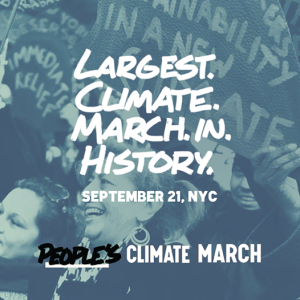 The environmental movement is often oversimplified. Don’t litter. Recycle. Save the Rain Forest. Great campaigns are often reduced to catchy phrases that minimize the needs of underrepresented people and communities who have been systematically excluded from the protection of basic human rights. Challenging popular interpretations of climate change, The New School’s Climate Action Week successfully brought social equity to the core of the People’s Climate March by hosting events that assembled diverse viewpoints ranging from indigenous women and community activists to economists and film directors.
The environmental movement is often oversimplified. Don’t litter. Recycle. Save the Rain Forest. Great campaigns are often reduced to catchy phrases that minimize the needs of underrepresented people and communities who have been systematically excluded from the protection of basic human rights. Challenging popular interpretations of climate change, The New School’s Climate Action Week successfully brought social equity to the core of the People’s Climate March by hosting events that assembled diverse viewpoints ranging from indigenous women and community activists to economists and film directors.
Looming science and political ambivalence have created hurdles to understanding the social implications of climate change. Milano’s Environmental Policy and Sustainability Management (EPSM) program prepares students with skills to understand the science behind environmental issues and devise management techniques that will impact cultural change.
Simply put: Climate change is a “wicked problem.”
What is a “wicked problem?” A multi-layered problem, so large and complex in scale that it cannot be tackled by one solution; thus multiple solutions are implemented with the scant understanding of how parts of the problem will be affected by those attempts. Global poverty could similarly be considered as another example of a “wicked problem.”
Highlights of the week included: the premiere of the documentary film Disruption and panel discussion, titled, “On the Rise: Global and Local Front-line Communities and the Climate Crisis.” These events leading up to the rally, gave voice to groups generally underrepresented in the conversation and shed light on the fact that those contributing most to the problem are the least affected by the overall damage.
Bill McKibben of 350.org explains, “It’s totally an accident that we even think of climate change as an environmental issue. You can just as easily think of it as another example of what happens in an unequal society.” His thoughts coupled with other well known leaders like Naomi Klein (author of This Changes Everything), Carl Anthony (co-founder of the Breakthrough Communities Project) who conveyed the message that climate change is more than saving the earth, but it also means justice for people. And it is everyone’s problem.
To conclude the week’s activities, The New School took to the streets on Sunday with 300,000 other marchers. Former EPA Administrator Lisa Jackson joined New School marchers in an electric demonstration. The climate justice cause united people that represented diversity in race, age, religion and nationality.
Climate Action Week marks the beginning of The New School’s work in climate justice. Under the leadership of Dean Michelle DePass, the Tishman Environment & Design Center (TEDC) was re-launched as a university-wide center tasked with advancing The New School’s sustainability agenda while also serving as a research hub for solutions to complex environmental problems. As a sponsor of Climate Action Week, TEDC interviewed many leaders and panelists with the goal of understanding how to support their front-line initiatives in climate justice. In an upcoming series titled #MarchOnward, TEDC will keep up the momentum from People’s Climate March by releasing content and creating programming to address those needs. For more information, keep in touch with us a @NewSchoolTEDC.
Alexandria McBride is a first year M.S. candidate in Environmental Policy and Sustainability Management Program. Alexandria joined the EPSM program with seven years of experience in environmental and operational project management, community-based consulting and finance. With her passion for environmental justice, Alexandria is excited to examine and tackle challenging environmental issues with her EPSM classmates and professors.
[feather_share skin=”wheel” size=”24″]


